|
The Never Ending Story:
Fantasy film inspires popular culture
Reviewed by Sureshni Pilapitiya
There certainly are some films that we can never forget because they
bring back a lot of memories. Some of them we have enjoyed as children
and cherished them deep within our hearts ever since.
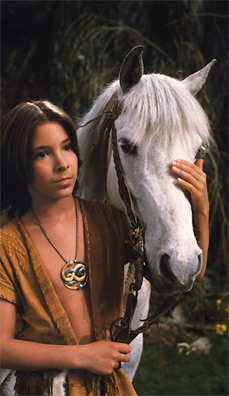 There have been films we have been watching over and over again, for
they had such a big impact on viewers. Such a cinematic creation can be
called a successful effort, not only by the directors and the producers
themselves, but also by the whole cast and crew. There have been films we have been watching over and over again, for
they had such a big impact on viewers. Such a cinematic creation can be
called a successful effort, not only by the directors and the producers
themselves, but also by the whole cast and crew.
There are many film categories such as horror films, romance,
classic, comedy and also action films.
Some of them include all or a few of these categories, but at the end
of the day, it’s the dedication and the talent of the cast and also the
talent and the concept, music, plot and theme of the film which make it
a box office hit.
During the 1970s and 1980s, there were many chart topping films such
as the Grease and Dirty Dancing. Even fantasy films were popular during
the period. The Never Ending Story was a film which fascinated children
and adults alike.
I was always captivated by its beautiful music and also the content,
and it was mostly because of the song Never Ending Story by Limahl.
The Never Ending Story (German: Die unendliche Geschichte) is a 1984
West German epic film based on the novel of the same name by Michael
Ende.
The film was directed and co-written by Wolfgang Petersen (his first
English-language film) and starred Barret Oliver, Noah Hathaway, Tami
Stronach, Moses Gunn, Thomas Hill and Alan Oppenheimer as the voices of
Falkor and Gmork.
At the time of its release, it was the most expensive film produced
outside the US or the USSR. It was then followed by two sequels: Never
Ending Story II: The Next Chapter and Never Ending Story III: Escape
From Fantasia. The film only adapts the first half of the book, and
consequently does not convey the message of the title as it was
portrayed in the novel.
The second half of the book would subsequently be used as the rough
basis for the second film (while the third film has a completely
original plot).
It’s an interesting, fantasy based story full of vivid imagination
and creativity.
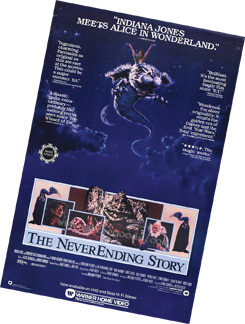 Bastian Bux (Barret Oliver) is a quiet boy who loves to read. He is
accosted by bullies on his way to school. Bastian Bux (Barret Oliver) is a quiet boy who loves to read. He is
accosted by bullies on his way to school.
He hides in a bookstore, interrupting the grumpy bookseller,
Koreander (Thomas Hill). Bastian asks about one of the books he sees,
but Koreander warns him it is “not safe.” Nevertheless, Bastian
“borrows” the book, leaving a note promising to return it, and races
towards school. He then hides in the school’s attic to begin reading The
Never-ending Story.
The book describes the fantasy world of Fantasia which is being
threatened by a force called “The Nothing,” a void of darkness that
consumes everything.
The Childlike Empress (Tami Stronach), who rules over Fantasia from
the Ivory Tower, has fallen ill due to the Nothing, and she has summoned
Atreyu (Noah Hathaway), a young warrior from the Plains People, to
discover the means to end the Nothing. Atreyu is given Auryn, a
medallion to protect and guide him. As Atreyu sets out the Nothing
summons Gmork (voiced by Alan Oppenheimer), a vicious and highly
intelligent werewolf, to kill Atreyu.
Atreyu’s quest directs him to an ancient being Morla that resides in
the Swamps of Sadness. Though Auryn protects Atreyu from its effects,
his beloved horse Artax is lost to the swamp. Atreyu continues through
the swamp, and is surprised when Morla reveals itself as a giant
tortoise-like being. Bastian is also surprised and lets out a scream. He
is curious that Atreyu and Morla appeared to have heard his scream.
Magical land
The book given by the grumpy bookseller facsinates Bastian and leaves
him entharalled. While reading the book, Bastian is connected with
what’s happening in that magical land, taking him along on a magical
journey, filled with fantasy and adventure.
Atreyu attempts to trek through the Swamps but even Auryn cannot
protect him indefinitely. Atreyu blacks out, but awakens, clean and
restored, next to the luckdragon Falkor (voiced by Alan Oppenheimer),
who had rescued Atreyu at the last minute and brought him to the
Southern Oracle.
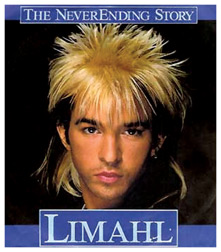 Two gnomes who helped restore Atreyu explain what they know about the
Oracle, including the trials that one must face before reaching it. Two gnomes who helped restore Atreyu explain what they know about the
Oracle, including the trials that one must face before reaching it.
As the Nothing draws near, Atreyu completes one trial and is
perplexed when the second trial, a mirror that shows the viewer’s true
self, reveals a boy matching Bastian’s description sitting in an attic
reading a book. Bastian recoils in shock and throws the book aside, but
cautiously continues reading after setting up candles in the darkened
attic. Atreyu, past the trials, stands before the Oracle, who tells him
the only way to save the Princess is to find a human child to give her a
new name, but such a child can only be obtained beyond the boundaries of
Fantasia. Atreyu and Falkor flee before the Nothing consumes the Oracle.
The two try to locate the boundary of Fantasia, but the power of the
Nothing has grown, and Atreyu is knocked from Falkor’s back into the Sea
of Possibilities, losing Auryn in the process. He wakes up on the shore
of an abandoned town, and as he explores, he finds a series of wall
paintings describing his quest to the present, including one of him
facing against Gmork.
When Atreyu recovers, he finds they are flying in a black void with
the only remnants of Fantasia floating around. Fearing his quest has
failed, Atreyu is elated when the Ivory Tower appears. After landing,
Atreyu races to see the Empress and apologises for his failure. To his
surprise, the Empress declares that he was successful, as he has brought
the human child, Bastian, with him through his adventure.
The story goes on, keeping the minds of the viewers curious to know
what’s going to happen next. Wolfgang Petersen has certainly made a
wonderful cinematic experience for the viewers to enjoy.
Production
The film adaptation only covered the first half of the book. The
majority of the movie was filmed in Germany, except for Barret Oliver’s
scenes, which were shot in Vancouver, BC, Canada. It was Germany’s
highest budgeted film of the time, and which made a German cinematic
creation become renowned all over the world.
|
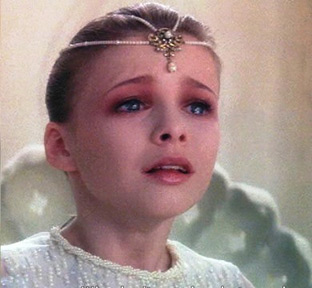
Why don't you do what you dream? |
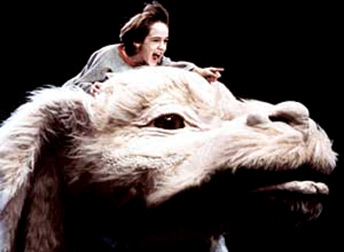 The film score of The Never Ending Story was composed by Klaus
Doldinger of the German jazz group Passport. The film score of The Never Ending Story was composed by Klaus
Doldinger of the German jazz group Passport.
The theme song of the North American release of the film was composed
by Giorgio Moroder with lyrics by Keith Forsey, and performed by Limahl
(lead singer of Kajagoogoo) and Beth Anderson. This song, along with
other “techno-pop” treatments to the soundtrack, are not present in the
German version of the film, which features Doldinger’s orchestral score
exclusively.
The theme song sung by Limahl was released as a single in 1984. It
peaked at No. 4 on the UK singles chart, No. 6 on the US Billboard Adult
Contemporary chart, and No. 17 on the Billboard Hot 100.
The film has since been an inspiration in popular culture. The
American metal band Atreyu derived their name from the character of
Atreyu. Another American rock band, Bayside, have used quotes from the
film as titles of their songs. Examples include “They look like strong
hands” and “They’re not horses, they’re unicorns”. |

